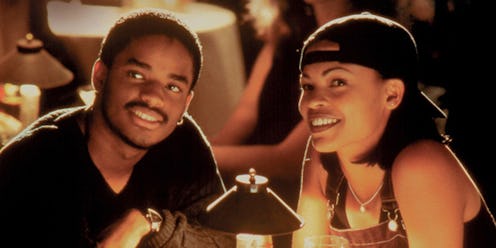Entertainment
‘Love Jones’ Shaped The Way I View Relationships

I'm sure that when first conceptualized, no one expected Love Jones to be as groundbreaking as it was — or still is. At that time in 1997, the only Black films that made it to the big screen seemed to be about guns, gang violence, or death. Not knocking such films as Boyz n the Hood or Menace II Society — especially since they are, without a doubt, classics in their own right — but seeing a group of Black artists on a quest for love, minus death and imprisonment, was an anomaly. However, it told a story that so many Black 20-somethings could relate to. And 20 years later, Loves Jones is just as relevant today.
Released on March 14, 1997, Love Jones was the first film for writer and director Ted Witcher. He developed Darius Lovehall and Nina Mosley's love story in his Koreatown apartment after being encouraged by a New Line Cinema film exec, according to an interview with the Los Angeles Times. Witcher used the inspiration of the '90s Chicago spoken word scene as his backdrop, and by doing so, only expected the film to touch the niche group. Little did he know, that very script would help shape many other Black rom-coms to come, both on the big and small screens.
I was 6 years old when the movie was first released, but I remember the impact that it had on my single mother at the time. All of a sudden, her Poetic Justice braids turned into a permed bob. She had two kids at the time, so that didn't leave a lot of extra money for a brown leather, Nina Mosley-esque jacket, or time to attend spoken word events. But, it did directly impact the way she looked at Black love. A bad boy was no longer on her radar — she wanted a smooth-talking, intelligent guy instead. And a few years later, she married my sweet and caring stepdad, who, coincidentally, also has a love for poetry.
My aunt, who's a decade younger than my mother, went to see Love Jones on a Saturday night in '97. She was a teenager at the time, and remembered coming out of the theater having a whole new outlook on what Black love was, as well. "I wanted someone to talk about me like he talked about Nina in that poem," she told me over the phone. "I wanted to be the 'funk' in somebody's step."
It was a total 180 from the type of relationship she was used to seeing in entertainment. Although tumultuous at times, Darius Lovehall and Nina Mosley's love affair was anything but violent. "Nina was open, and true love was able to come to her," my aunt said. "When you let go of the bad stuff, the good stuff comes."
Just like my aunt, I too became obsessed with Love Jones in my teenage years. The film shaped how I look at love and relationships. Darius Lovehall sat on the same pedestal that I placed Dwayne Wayne and Will Smith. All of these characters helped show me what it looks like when a man really loves a woman. It doesn't involve a slap in a face or infidelity. It was OK to fall for the good guy.
Just like it does for Tom Hanks and Meg Ryan time after time, safe and loving spaces can exist among Black folks too. Love Jones proves this to be true.